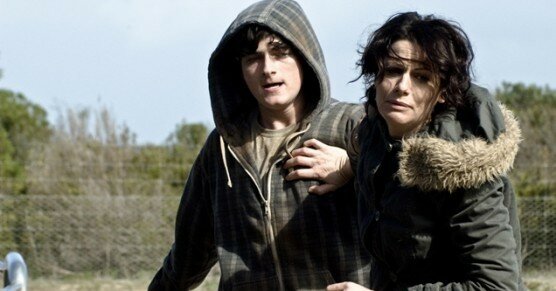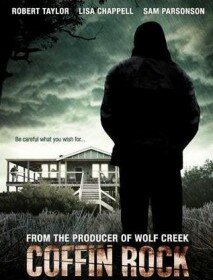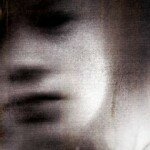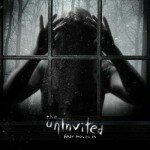Just off the beaten track from Wolf Creek and Cape Fear is Rupert Glasson’s promising feature debut Coffin Rock; a must-see destination for deftly crafted thrills and chills. In fact, this surprisingly good thriller might even satisfy those without a lust for blood, as the film initially masquerades as an earnest drama about a rural couple’s fruitless attempt to conceive a child. But as soon as a psychopathic third party gets involved (ala Fatal Attraction with the gender roles reversed), Coffin Rock suddenly shifts into high-gear for a fierce, if somewhat contrived, horror finale.
Working closely with producers Ayisha Davies (Wolf Creek) and David Lightfoot, Glasson spent a solid two years perfecting the screenplay for the film before it went into production mid 2008. His diligence has paid off, as although Coffin Rock is short on original ideas, the film succeeds in doing what far too many Hollywood horrors forget to do; make us care about the characters before things turn ugly.
The story revolves around Jess and Rob Willis (Lisa Chappell and Robert Taylor), a happily married couple living in a remote South Australian fishing town. After trying to conceive a baby for years, Rob must face up to the daunting possibility that he is infertile, and is pressured by his desperate wife to travel to an IVF clinic in the city to be tested. Behind the desk of the clinic is 18 year-old Irishman Evan (Sam Parsonson), who immediately falls in love with Jess even though she doesn’t even notice him in the room. Evan begins to stalk Jess, taking advantage of her in a drunken state, causing Evan’s infatuation to turn sickly obsessive. Afraid to face up to her husband, Jess must deal with the guilt of her one-night stand, not to mention the fact that she is now pregnant with what is likely to be Evan’s child.
Starting off as a drama about infertility, sexual liaisons and crazed stalkers, Coffin Rock sounds an awful lot like a season finale for a TV soapie (it even has a cliff-hanger ending, literally). But thanks to Glasson’s level-headed screenplay and taut direction, the film transcends any less-than desirable comparisons to daytime TV. The drama, for one, is credibly handled, such as Rob’s masculinity being undermined by his impotence. This is aided considerably by Robert Taylor’s top tier performance, using subtle shifts in body language to make dialogue seem redundant. Lisa Chappell also delivers the goods as Jess, a refreshingly confident woman who asserts herself in a male-dominated community. Together, the two have undeniable chemistry, which is why we show genuine concern when the disturbed Evan throws a spanner in the works.
![2009_coffin_rock_002[1] 2009 coffin rock 0021 186x280 Coffin Rock (Review)](/wp-content/uploads/2009_coffin_rock_0021-186x280.jpg) |
Sam Parsonson capably handles the transition from introvert to blaring psychopath as Evan, a young lad who turns out to be as volatile as a dissolvable bag of water. I do, however, take issues with the motivation of his character; his initial encounter with Jess is so trifling, it’s hard to believe that infatuation festered as a result. Moreover, while his traumatic past is often hinted at during near-subliminal flashbacks, it’s hardly enough to warrant his psychotic state of mind. Yes, some people do just snap, but there’s usually a trigger, and it would have been nice to see Glasson’s screenplay explore this with more depth.
Cinematographer David Foreman uses a suitably drab palate to match the desolate South Australian scrublands, framing chunks of the film in an unsettling fly on the wall fashion. To the beat of John Gray’s edgy score, Foreman progressively amps-up the use of handheld camera as Evan’s descent into madness reaches boiling point. Thankfully, when elements of horror do start to seep in, Glasson doesn’t solely resort to cheap jump scares to get our hearts thumping, letting genuine suspense build from Evan’s eerie omnipresence and the audience’s awareness of what’s to come. That said, predictability tends to get the better of the film during the final act, as a number of genre conventions are spotted a mile away. Yet the impact remains due to our invested interest in these characters, and the simple fact that Glasson uses these conventions correctly.
I do hope Coffin Rock performs better on the international circuit than it did at the Australian box office, as its severely limited release in October made it near impossible to catch in cinemas. When American horror’s like Paranormal Activity — which was made on a measly budget of just $15,000 (US) — can top the Australian box office in its opening weekend, it baffles me why our film industry still invests little in making and, more to the point, marketing pictures like Coffin Rock. If the film follows the likes of the equally impressive, equally ignored Lake Mungo, expect to see a Hollywood remake soon that Australian moviegoers will no doubt lap it up, completely oblivious to its origins.
– this review originally appeared at In Film Australia.
 Follow the author Anders Wotzke on Twitter.
Follow the author Anders Wotzke on Twitter.
















